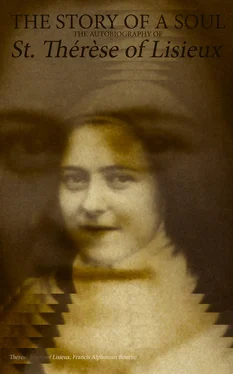Soon after my First Communion I went into retreat again, before being confirmed. I prepared myself with the greatest care for the coming of the Holy Ghost; I could not understand anyone not doing so before receiving this Sacrament of Love. As the ceremony could not take place on the day fixed, I had the consolation of remaining somewhat longer in retreat. How happy I felt! Like the Apostles, I looked with joy for the promised Comforter, gladdened by the thought that I should soon be a perfect Christan, and have the holy Cross, the symbol of this wondrous Sacrament, traced upon my forehead for eternity. I did not feel the mighty wind of the first Pentecost, but rather the gentle breeze which the prophet Elias heard on Mount Horeb. On that day I received the gift of fortitude in suffering—a gift I needed sorely, for the martyrdom of my soul was soon to begin.
When these delightful feasts, which can never be forgotten, were over, I had to resume my life as a day scholar, at the Abbey. I made good progress with my lessons, and remembered easily the sense of what I read, but I had the greatest difficulty in learning by heart; only at catechism were my efforts crowned with success. The Chaplain called me his little "Doctor of Theology," [7]no doubt because of my name, Thérèse.
During recreation I often gave myself up to serious thoughts, while from a distance I watched my companions at play. This was my favourite occupation, but I had another which gave me real pleasure. I would search carefully for any poor little birds that had fallen dead under the big trees, and I then buried them with great ceremony, all in the same cemetery, in a special grass plot. Sometimes I told stories to my companions, and often even the big girls came to listen; but soon our mistress, very rightly, brought my career as an orator to an end, saying she wanted us to exercise our bodies and not our brains. At this time I chose as friends two little girls of my own age; but how shallow are the hearts of creatures! One of them had to stay at home for some months; while she was away I thought about her very often, and on her return I showed how pleased I was. However, all I got was a glance of indifference—my friendship was not appreciated. I felt this very keenly, and I no longer sought an affection which had proved so inconstant. Nevertheless I still love my little school friend, and continue to pray for her, for God has given me a faithful heart, and when once I love, I love for ever.
Observing that some of the girls were very devoted to one or other of the mistresses, I tried to imitate them, but I never succeeded in winning special favour. O happy failure, from how many evils have you saved me! I am most thankful to Our Lord that He let me find only bitterness in earthly friendships. With a heart like mine, I should have been taken captive and had my wings clipped, and how then should I have been able to "fly away and be at rest"? [8]
How can a heart given up to human affections be closely united to God? It seems to me that it is impossible. I have seen so many souls, allured by this false light, fly right into it like poor moths, and burn their wings, and then return, wounded, to Our Lord, the Divine fire which burns and does not consume. I know well Our Lord saw that I was too weak to be exposed to temptation, for, without doubt, had the deceitful light of created love dazzled my eyes, I should have been entirely consumed. Where strong souls find joy and practise detachment faithfully, I only found bitterness. No merit, then, is due to me for not having given up to these frail ties, since I was only preserved from them by the Mercy of God. I fully realised that without Him I should have fallen as low as St. Mary Magdalen, and the Divine Master's words re-echoed sweetly in my soul. Yes, I know that "To whom less is forgiven he loveth less," [9]but I know too that Our Lord has forgiven me more than St. Mary Magdalen. Here is an example which will, at any rate, show you some of my thoughts.
Let us suppose that the son of a very clever doctor, stumbling over a stone on the road, falls and breaks his leg. His father hastens to him, lifts him lovingly, and binds up the fractured limb, putting forth all his skill. The son, when cured, displays the utmost gratitude, and he has excellent reason for doing so. But let us take another supposition.
The father, aware that a dangerous stone lies in his son's path, is beforehand with the danger and removes it, unseen by anyone. The son, thus tenderly cared for, not knowing of the mishap from which his father's hand has saved him, naturally will not show him any gratitude, and will love him less than if he had cured him of a grievous wound. But suppose he heard the whole truth, would he not in that case love him still more? Well now, I am this child, the object of the foreseeing love of a Father "Who did not send His son to call the just, but sinners." [10]He wishes me to love Him, because He has forgiven me, not much, but everything. Without waiting for me to love Him much, as St. Mary Magdalen did, He has made me understand how He has loved me with an ineffable love and forethought, so that now my love may know no bounds.
I had often heard it said, both in retreats and elsewhere, that He is more deeply loved by repentant souls than by those who have not lost their baptismal innocence. Ah! If I could but give the lie to those words. . . .
But I have wandered so far from my subject that I hardly know where to begin again. It was during the retreat before my second Communion that I was attacked by the terrible disease of scruples. One must have passed through this martyrdom to understand it. It would be quite impossible for me to tell you what I suffered for nearly two years. All my thoughts and actions, even the simplest, were a source of trouble and anguish to me; I had no peace till I had told Marie everything, and this was most painful, since I imagined I was obliged to tell absolutely all my thoughts, even the most extravagant. As soon as I had unburdened myself I felt a momentary peace, but it passed like a flash, and my martyrdom began again. Many an occasion for patience did I provide for my dear sister.
That year we spent a fortnight of our holidays at the sea-side. My aunt, who always showed us such motherly care, treated us to all possible pleasures—donkey rides, shrimping, and the rest. She even spoiled us in the matter of clothes. I remember one day she gave me some pale blue ribbon; although I was twelve and a half, I was still such a child that I quite enjoyed tying it in my hair. But this childish pleasure seemed sinful to me, and I had so many scruples that I had to go to Confession, even at Trouville.
While I was there I had an experience which did me good. My cousin Marie often suffered from sick headaches. On these occasions my aunt used to fondle her and coax her with the most endearing names, but the only response was continual tears and the unceasing cry: "My head aches!" I had a headache nearly every day, though I did not say so; but one evening I thought I would imitate Marie. So I sat down in an armchair in a corner of the room, and set to work to cry. My aunt, as well as my cousin Jeanne, to whom I was very devoted, hastened to me to know what was the matter. I answered like Marie: "My head aches." It would seem that complaining was not in my line; no one would believe that a headache was the reason of my tears. Instead of petting me as usual, my aunt spoke to me seriously. Even Jeanne reproached me, very kindly it is true, and was grieved at my want of simplicity and trust in my aunt. She thought I had a big scruple, and was not giving the real reason of my tears. At last, getting nothing for my pains, I made up my mind not to imitate other people any more. I thought of the fable of the ass and the little dog; I was the ass, who, seeing that the little dog got all the petting, put his clumsy hoof on the table to try and secure his share. If I did not have a beating like the poor beast, at any rate I got what I deserved—a severe lesson, which cured me once for all of the desire to attract attention.
Читать дальше












